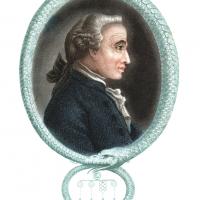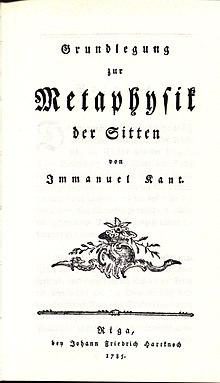Immanuel Kant
Kant, a Prussian philosopher from the eighteenth-century, expanded the idea of the general will into his formulation of the Categorical Imperative. The Categorical Imperative is a universal moral law which applies to all circumstances and is not subject to any inclinations.1 The Categorical Imperative is defined as follows: “Act in such a way as to treat humanity, whether in your own person or in that of anyone else, always as an end and never merely as a means.” 2
This thus articulates the idea that every person has intrinsic value—something that Kant refers to as dignity.3 Because of this dignity, people should be respected and never treated as just a tool for others to use. People—because of their human dignity—deserve to have their rights protected to ensure that they are never treated merely as a means. Kant is promoting the idea of a common good because he articulates a universal maxim to protect every individual from exploitation. Thus, the movement toward the rights of the community rather than just individuals ensures that every person in the community is protected, rather than just those with the means to advocate for themselves.
Kant also articulates the idea that the human race is moving toward “the end of history”—the period where all people abide by the categorical imperative and there is perpetual peace.4 While he argues that it is unlikely that any single generation will achieve this goal, he articulates that that is the way that history is progressing. Thus, Kant is saying that there is a moral arc of history.
His idea of perpetual peace includes a league of nations so that the international sphere can escape from the state of nature. As such, nations would create a confederation of states which would be able to make decisions and achieve a universal sense of justice.5 Instead of the chaotic relations where no country has an established means of mediation, this league would serve to promote peace and ensure that the rights of all states and people are protected.
1. Kant, Immanuel. Toward Perpetual Peace and Other Writings on Politics, Peace, and History. Edited by Pauline Kleingeld. Translated by David L. Colclasure. New Haven, CT: Yale University Press, 2006, ix.
2. Kant, Immanuel. Groundwork of the Metaphysics of Morals. Translated by Jonathan Bennett. Early Modern Texts, 2017. https://www.earlymoderntexts.com/assets/pdfs/kant1785.pdf, 29.
3. ibid, 33.
4. Kant, Toward Perpetual Peace and Other Writings on Politics, Peace, and History, 8: 19.
5. ibid, 8: 354.

